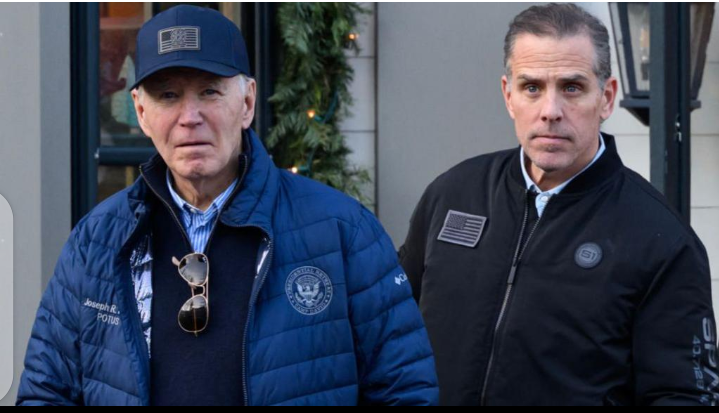Biden’s Pardon Of Son Sparks National Debate.
President Joe Biden has issued a sweeping pardon for his son, Hunter Biden, covering potential federal crimes committed over the past decade. This unprecedented move has ignited intense debate across the United States, drawing both criticism and support from various political figures.
Hunter Biden, 54, was set to face sentencing later this month in two federal cases involving tax and gun-related charges. The pardon also extends to any federal offences Hunter may have committed between January 2014 and December 2024, a period that includes his tenure as a board member at Ukrainian energy company Burisma.
A Decision Rooted in Family and Politics
White House Press Secretary Karine Jean-Pierre disclosed that President Biden wrestled with the decision during the family’s Thanksgiving break in Nantucket, Massachusetts. Speaking to reporters en route to Angola, she explained the President’s reasoning:
“He believes in the justice system, but he also believes that raw politics infected the process and led to a miscarriage of justice. He felt his son was singled out because of who he is, and this pardon was necessary to protect him from ongoing political persecution.”
Jean-Pierre acknowledged that as recently as last month, Biden had denied any intention to pardon his son.
First Lady Jill Biden publicly backed her husband’s decision, stating:
“Of course, I support the pardon of my son.”
Political Fallout
Republicans have sharply criticised the pardon. President-elect Donald Trump called it “an abuse and miscarriage of justice,” while House Speaker Mike Johnson claimed the decision has “irreparably damaged trust in the justice system.”
House Oversight Committee Chairman James Comer accused Biden of dishonesty regarding his family’s alleged influence-peddling activities, stating that the President had “lied from start to finish.”
Some Democrats have also voiced concerns. Colorado Senator Michael Bennet stated that the pardon prioritised personal interests over duty, eroding public trust. However, others defended Biden, including Texas Democrat Jasmine Crockett, who argued that the pardon corrected a perceived injustice.
Legal and Historical Context
The pardon marks a significant moment in U.S. history, as it involves the first child of a sitting president to face criminal conviction. Hunter Biden was convicted in June for lying about his drug use on a gun purchase form and pleaded guilty in September to multiple tax offences.
David Weiss, the special counsel overseeing Hunter’s cases, rejected claims of political targeting, asserting in court filings that no evidence of vindictive prosecution existed.
Neama Rahmani, a former federal prosecutor, described the pardon as premeditated, stating:
“President Biden misled the American people when he said he wouldn’t pardon his son. This was the plan from the beginning.”
While critics argue that the move undermines the rule of law, supporters claim it addresses the undue politicization of the justice system.
Presidential Pardons: A Controversial Tradition
The presidential pardon is an absolute power that cannot be overturned by Congress or a successor, ensuring Trump cannot rescind the decision when he takes office in January.
A chart comparing presidential pardons since 1945 highlights that Biden has granted fewer pardons than most recent presidents, though this latest act has sparked one of the most contentious debates in the history of executive clemency.
A Nation Divided
As the controversy unfolds, Americans remain divided on the implications of Biden’s decision. For some, it symbolises a father’s unwavering support for his son, while others view it as a dangerous precedent that erodes faith in the justice system. The debate underscores the tension between personal loyalty and public accountability in the nation’s highest office.



